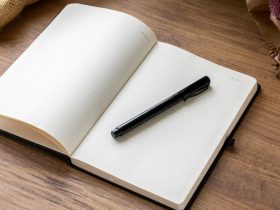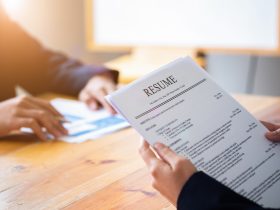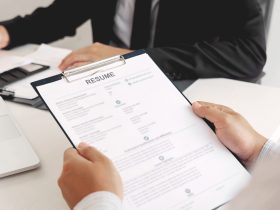Crafting a Stellar Introduction
Mastering “How to introduce yourself in an interview?” and answering the question efficiently helps to complete the interview comfortably. Setting the stage with a memorable introduction is paramount for job interviews. The “Tell me about yourself” question frequently serves as an initial icebreaker. Contrary to popular belief, this is not an invitation for an exhaustive autobiography; it’s a chance to capture your professional journey and spotlight your significant accomplishments succinctly.
Kick-off by offering a concise overview of your educational background before transitioning seamlessly into your professional experiences. Think about your three strengths that you can convey to the interviewer in a job interview. Emphasize instances that seamlessly align with the job description, showcasing your skills and expertise. Throughout, maintain an air of positivity and confidence, and consider peppering in a personal anecdote that reflects your eagerness for the industry.
Solving Decoding Common Interview Queries
The navigating technique is often used in common questions in an Interview. Many interviewers frequently rely on standardized questions to gauge candidates’ suitability for the role. Familiarize yourself with these common inquiries and practice formulating well-structured and thoughtful responses:
1. How to Answer Interview Questions: “What are your strengths and weaknesses?”
Highlight three of your most notable strengths, whether they involve adaptability, teamwork, or astute problem-solving skills. Conversely, when discussing your weaknesses, choose areas where you’ve proactively taken steps to improve. For instance, you might delve into how you previously encountered challenges in time management but have since cultivated effective strategies to overcome this hurdle.
2. Describing your persona and Responding to “Tell Me About Yourself”
Tailor your response to align seamlessly with the requirements of the job at hand. If the role places a premium on leadership, expound upon your ability. In the context of a creative role, illuminate your imaginative thinking and artistic flair. Bolster your narrative with concrete examples derived from your past endeavors.
3. Addressing “3 Weaknesses to Highlight in a Job Interview” in a Constructive Light
In showcasing weaknesses, avoid pitfalls by selecting shortcomings that have transformed into growth areas. Highlight how these weaknesses, such as time management struggles, have evolved into opportunities for learning and self-improvement.
Navigating the Interview Landscape: Unveiling
“How interviews are conducted” enables stress management. Understanding the mechanics of how interviews unfold can alleviate a substantial portion of anxiety. You can reduce your stress by learning details such as how to ask interview questions. Generally, interviews follow a structured trajectory. Interview questions to prepare for the discussion can be listed as follows:
1. Begin with an introduction:
The interviewer acquaints themselves with you and outlines the course of the interview.
2. The spotlight on questions:
The crux of the interview hinges on the interviewer posing a series of questions to gauge your compatibility with the role.
3. The stage is yours:
You can pose your questions as the interview winds down.
4. Bringing closure:
The interviewer concludes the session by shedding light on the subsequent steps and providing an estimated timeline for feedback.
Tailoring Attire to Fit the Occasion
Remember that interviews serve as an avenue for the interviewer to comprehend you better and ascertain your alignment with the role. Approach the consultation as a dialogue rather than an interrogation. Dressing for success in navigating clothes for an interview is one of the essential details of the meeting. Your outfit shows your attention to detail and helps you show your professionalism. While dress codes vary across industries, leaning toward a slightly more formal ensemble than the company’s dress code is often advisable. Here are some tips to consider:
1. Opt for a well-fitted suit or a conservative dress in neutral hues in a corporate environment.
Keep accessories minimal and ensure your shoes are polished.
2. In a creative setting:
Use the opportunity to showcase your style while still maintaining a professional appearance. A chic blouse, a blazer, and well-fitted slacks or a skirt can convey professionalism and creativity.
3. In a casual atmosphere:
Avoid overly simple choices such as jeans and t-shirts, even in a relaxed context. Opt for well-fitting business casual attire that portrays you as a dedicated candidate.
4. Turning the Tables: Posing relevant commonly asked questions in an Interview helps to grab the interviewer’s attention.
Towards the interview’s conclusion, the spotlight turns to you as you’re given the chance to pose your questions. This segment serves as a means of gathering insights and a platform for demonstrating your enthusiasm and engagement.
Navigating ‘’What Interview Questions Should I Ask’’
Craft questions that underscore your genuine curiosity about the role and the organization:
1. What interview questions should I ask about the expected trajectory for someone in the position?
You may wonder how I should answer. This question inquiry showcases your aspirations for growth within the company.
2. Inquire about the organization’s valued qualities in team members
This question demonstrates your desire to align with the company’s values and culture.
3. Probe the challenges and prospects the team currently faces:
This question illustrates your strategic thinking and how your potential contributions could help surmount challenges.









